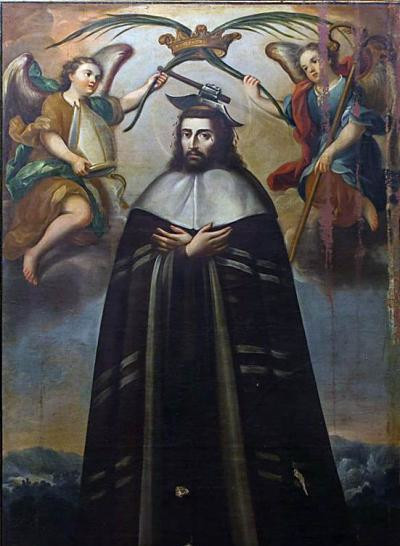
Saint of the Day for 12 November: St. Jehoshaphat Kuncewycz
St. Jehoshaphat Kuncewycz: the martyr of the Ukrainian Greek Catholic Church
Name
St. Jehoshaphat Kuncewycz
Title
Bishop and martyr
Birth
1580, Vladimir, Poland
Death
November 12, 1623, Vitebsk, Belarus
Recurrence
12 November
Martyrology
2004 edition
Beatification
May 16, 1643, Rome, Pope Urban VIII
Canonization
June 29, 1867, Rome, Pope Pius IX
Prayer
O God, who in the glorious martyrdom of St. Jehoshaphat Kuncewycz bishop gave us a sign of your loving presence in the Church, grant that we, who trust in his intercession, may imitate him in firmness of faith. Through our Lord Jesus Christ.
Roman Martyrology
Commemoration of the Passion of St. Jehoshaphat (John) Kuncewicz, bishop of Polotzk and martyr, who pushed his flock to Catholic unity with constant zeal, cultivated the Byzantine-Slavic rite with loving devotion and, in Vitebsk in Belarus, at that time under Polish jurisdiction, cruelly.
The Saint and Mission
St. Josaphat Kuncewycz, archbishop of Polotsk and martyr for the unity of the Church, offers an extraordinary example of how Christian mission can be lived out through sacrifice and commitment to reconciliation. His life and ministry are emblematic of the tireless search for unity among Christians at a time when religious divisions and contrasts were deeply entrenched. Born into a complex historical context marked by tensions between Catholicism and Orthodoxy, Jehoshaphat worked fervently to promote the unity of the Church, upholding communion with the See of Rome while respecting Eastern liturgical and cultural traditions. His mission was animated by the conviction that the unity of the Church was essential for the full realization of its nature and mission in the world. Jehoshaphat did not pursue this mission with a spirit of conquest or supremacy, but rather with an approach of dialogue, respect and mutual understanding. His was a bridge-building mission, seeking to overcome historical and theological prejudices through the witness of a love that transcends barriers. He embodied the evangelical ideal of the good shepherd, dedicating his life to the service of the flock entrusted to him, with a special commitment to pastoral care and clergy training. St. Jehoshaphat’s martyrdom is the ultimate testimony to his commitment to mission. He accepted suffering and death rather than give up his dream of unity in truth and love. His death was not a failure of his mission, but rather his highest affirmation: a sign of fidelity to Christ and the Church, and a powerful message that love and sacrifice are the basis of Christian unity. St. Jehoshaphat’s life reminds us that Christian mission requires courage, perseverance and sometimes even the supreme sacrifice. His example continues to inspire all those who work for the unity of the Church, showing that true mission is a journey of faith, hope and charity that can transform hearts and renew the world. His legacy remains a beacon of light for an ecumenism lived in a spirit of truth and love, an invitation to follow Christ beyond divisions and toward full and visible communion.
The Saint and Mercy
St. Josaphat Kuncewycz, in his mission as a bridge between Eastern and Western Christian traditions, embodied mercy as a fundamental element of Christianity in an exemplary way. His life, culminating in martyrdom, is a powerful testimony to how mercy can be both a force for reconciliation and a sign of radical fidelity to Gospel principles. Jehoshaphat’s service was characterized by a deep sense of empathy and understanding for those on the other side of the church divide. This mercy manifested itself not just as tolerance or passive acceptance, but as a genuine desire to understand, respect and love those who differed from him in practice and doctrine. His was a mercy that actively sought dialogue, working to build bridges where others erected barriers. His dedication to church unity was rooted in a deep conviction of God’s mercy, which calls all to fellowship and forgiveness. Jehoshaphat lived this call not only in his words but also in his actions, showing great patience and kindness, even in the face of strong opposition and hostility. His ability to forgive his persecutors and love his enemies was a direct reflection of Christ’s merciful love, which he sought to emulate. St. Jehoshaphat’s martyrdom is the pinnacle of his witness to mercy. In his supreme sacrifice, he embodied the essence of Christian mercy: giving one’s life for one’s friends and enemies in the name of a greater love. This ultimate act of self-giving is a powerful reminder that mercy may require the greatest sacrifice, but it is also the path to true spiritual victory: the victory of love over divisions, of unity over discord. St. Josaphat Kuncewycz reminds us that mercy is fundamental to Christian mission. His example inspires us to live mercy not just as a feeling, but as a concrete action that seeks to heal divisions, overcome prejudice and build peace in the body of Christ. His life is an invitation to all of us to be instruments of mercy in a fragmented world, following in the footsteps of a saint who loved the Church and its members deeply, even to the ultimate gift of self.
Hagiography
The divine Master said that the good shepherd lays down his life for his sheep: and we see an illustrious confirmation of this today in St. Josaphat, bishop of Polvez and martyr. Born in Vladimir in Poland to the noble and Catholic Kuncewizio family, as a boy listening to his mother speak of Christ’s passion, a dart departed from the side of the Crucifix and went to wound his heart. Inflamed with love of God and desiring perfection, he entered the order of St. Basil, whose rule he professed at the age of twenty. He went barefoot despite the excessive rigors of winter in Poland and…
